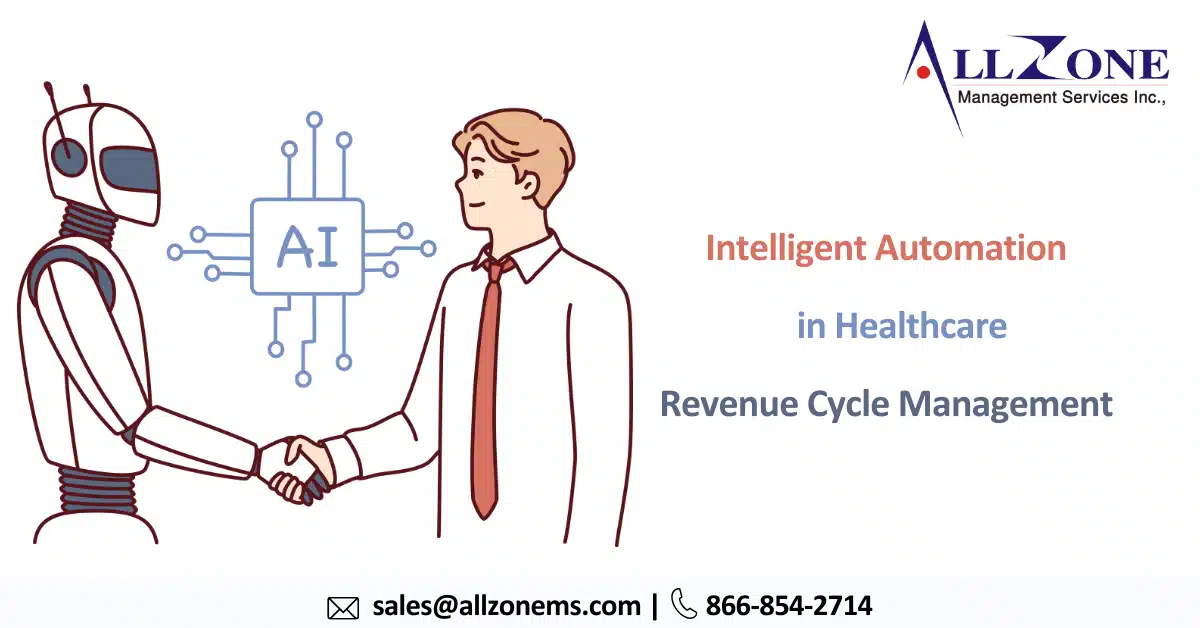The healthcare industry has long buzzed about the potential of Artificial Intelligence (AI) to revolutionize financial operations and internal workflows. However, for practical solutions tackling the complexities of RCM, intelligent automation offers a more realistic path forward.
Why Intelligent Automation Over AI?
True AI strives to mimic human cognition, but it remains in its early stages, particularly within the healthcare landscape. Intelligent automation, on the other hand, leverages existing, proven technologies to create a more robust solution. This includes:
-
- Self-service platforms: Empowering patients with online portals and kiosks for tasks like appointment scheduling and bill payments.
- Cognitive automation: Mimicking human decision-making for tasks requiring analysis and judgment.
- Natural language processing (NLP): Extracting meaning from unstructured data like physician notes and patient records.
- Web service integration: Seamlessly connecting disparate healthcare systems for efficient data exchange.
- Robotic process automation (RPA): Automating repetitive tasks traditionally handled by human staff.
The goal of intelligent automation is to augment the human workforce, not replace it. By streamlining mundane, transactional RCM tasks, it frees staff to focus on higher-value activities. This translates to:
-
- Increased RCM accuracy and efficiency
- Improved staff satisfaction
- Enhanced patient experience
Intelligent Automation Addressing Core RCM Challenges
Let’s delve into three key RCM hurdles and how intelligent automation empowers healthcare organizations to overcome them:
Challenge #1: Achieving Scalability
Hospitals and health systems require RCM solutions that deliver substantial, enterprise-wide results. “Science fair” technology, offering flashy concepts with limited practicality, is a risky investment. Instead, RCM solutions need to be purpose-built to handle variable tasks at scale. For instance, automating a typical claims denial workflow across a vast healthcare system.
Traditional automation efforts often struggled with scalability. Variations in workflows could cause systems to malfunction. Intelligent automation, however, can be trained to accommodate these variations, ensuring consistent and efficient task completion.
Real-World Example:
A leading healthcare organization implemented intelligent automation to streamline RCM processes. This resulted in:
-
- Over 1,000 RCM use cases successfully automated at scale.
- Activation of over 160 digital workers equivalent to 700-1,000 full-time employees.
- These “digital workers” now handle over 4.5 million transactions annually, representing 15.6 million tasks across 30 EMR platforms and 100 locations.
Choosing the Right Partner:
Beware of vendors like Allzone’s overhyping their technology’s capabilities. Focus on those who demonstrate a clear understanding of your specific RCM challenges and how their intelligent automation solutions can address them. Don’t be fooled by claims of unrealistic accuracy rates. Ask if the solution scales effectively across a broad range of real-world scenarios
Challenge #2: Elevating Patient Satisfaction
Many patients describe the healthcare experience as frustrating and fragmented. Imagine the convenience of airline check-in seamlessly translated to the doctor’s office. Intelligent automation can facilitate this transformation.
Empowering Patients:
Intelligent automation empowers patients by removing manual, disconnected processes and creating a smoother financial experience. Examples include:
-
- Digital self-service applications: Online platforms and registration kiosks for tasks like appointment scheduling and bill payments.
- Out-of-pocket cost estimators: Tools that provide patients with transparent cost information at the time of scheduling, enabling informed healthcare choices.
- Data-driven payment options: Algorithms help predict patients’ ability to pay, allowing for tailored payment plans and financial assistance programs.
Benefits for All:
Both patients and healthcare organizations reap the rewards of intelligent automation in this area. For instance, one organization witnessed:
-
- An 80% increase in patients using digital check-in solutions.
- A 50% reduction in front-end manual work.
- A 20% increase in patient yield.
- A 40% improvement in patient satisfaction scores.
Challenge #3: Reducing Costs
The healthcare industry operates under constant pressure to “do more with less.” Intelligent automation offers a strategic solution by creating a cost-effective “digital workforce” to augment human staff.
Streamlining Denials Management:
Denials management workflows provide a prime example. Many healthcare systems rely on personnel to review potentially denied claims and route them for correction. Intelligent automation can perform these tasks faster and more effectively, freeing staff for other critical duties.
The Advantages:
-
- Faster cash flow: Streamlined claims processing means quicker reimbursement.
- Reduced staffing constraints: Automation handles repetitive tasks, alle.

